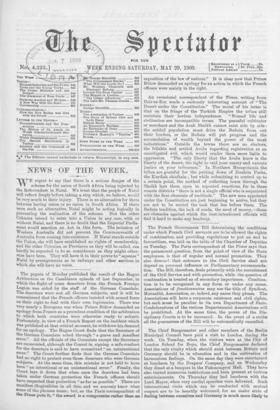An occasional correspondent of the Times, writing from Deir-oz-Zor, sends
a curiously interesting account of " The Desert under the Constitution." The moral of his letter is that on the fringe of the Turkish Empire the tribes still maintain their lawless independence. "Nomad life and' civilisation are incompatible terms. The peaceful cultivator or merchant and the Arab Sheikh cannot exist side by side : the settled population must drive the Beduin from out their borders, or the Beduin will put progress and the accumulation of wealth beyond the power of the most industrious." Outside the towns there are no electors, the fellahin and settled Arabs regarding registration as an unmitigated evil, which would render them more liable to oppression. "The only liberty that the Arabs know is the liberty of the desert, the right to raid your enemy and execute justice on your tribesmen." In Northern Mesopotamia the tribes are grateful for the putting down of Ibrahim Pasha, the Kurdish chieftain ; but while submitting to control up to a certain point, the method of collecting taxes through the Sheikh lays them open to repeated exactions, for in these remote districts " there is not a single official who is acquainted with the first elements of rectitude." The new men appointed under the Constitution are just beginning to arrive, but they are not to be envied the task that lies before them. The Beduin tradition, the lack of roads, the need of money,—those are obstacles against which the best-intentioned officials will find it hard to make any headway.






































